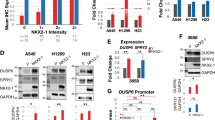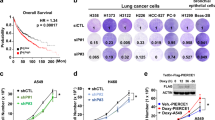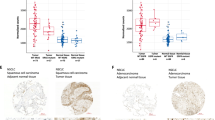Abstract
K-ras mutations are associated with smoking-induced lung cancer and poor clinical outcomes. In mice, K-ras mutations are sufficient to induce lung tumors, which require phosphoinoside-3-kinase (PI3K) and further downstream, mammalian target of rapamycin (mTOR) activation. However, the roles of individual Akt isoforms that link PI3K and mTOR are unknown. Here, we show that deletion of Akt1 but not Akt2 or Akt3 prevents lung tumorigenesis in a tobacco carcinogen-induced model and a genetic model. Akt1 deletion prevented tumor initiation as well as tumor progression, coincident with decreased Akt signaling in tumor tissues. In contrast, deletion of Akt3 increased tumor multiplicity in the carcinogen model and increased tumor size in the genetic model. Fibroblasts lacking Akt1 are resistant to transformation by mutant K-ras and stimulation by epidermal growth factor. Human lung cancer cells with mutant K-ras and diminished Akt1 levels fail to grow in vivo. These data suggest that Akt1 is the primary Akt isoform activated by mutant K-ras in lung tumors, and that Akt3 may oppose Akt1 in lung tumorigenesis and lung tumor progression. Given that Akt inhibitors in clinical development as cancer therapeutics are not isoform selective, these studies support specific targeting of Akt1 to mitigate the effects of mutant K-ras in lung cancer.
This is a preview of subscription content, access via your institution
Access options
Subscribe to this journal
Receive 50 print issues and online access
$259.00 per year
only $5.18 per issue
Buy this article
- Purchase on Springer Link
- Instant access to full article PDF
Prices may be subject to local taxes which are calculated during checkout






Similar content being viewed by others
References
Askham JM, Platt F, Chambers PA, Snowden H, Taylor CF, Knowles MA . (2010). AKT1 mutations in bladder cancer: identification of a novel oncogenic mutation that can co-operate with E17K. Oncogene 29: 150–155.
Belinsky SA, Devereux TR, Maronpot RR, Stoner GD, Anderson MW . (1989). Relationship between the formation of promutagenic adducts and the activation of the K-ras protooncogene in lung tumors from A/J mice treated with nitrosamines. Cancer Res 49: 5305–5311.
Bulavin D, Kovalsky O, Hollander M, Fornace AJ . (2003). Loss of oncogenic H-ras-induced cell cycle arrest and p38 mitogen-activated protein kinase activation by disruption of Gadd45a. Mol Cell Biol 23: 3859–3871.
Buzzi F, Xu L, Zuellig RA, Boller SB, Spinas GA, Hynx D et al. (2010). Differential effects of protein kinase B/Akt isoforms on glucose homeostasis and islet mass. Mol Cell Biol 30: 601–612.
Carpten J, Faber A, Horn C, Donoho G, Briggs S, Robbins C et al. (2007). A transforming mutation in the pleckstrin homology domain of AKT1 in cancer. Nature 448: 439–444.
Chen M, Xu P, Peng X, Chen W, Guzman G, Yang X et al. (2006). The deficiency of Akt1 is sufficient to suppress tumor development in Pten+/− mice. Genes Dev 20: 1569–1574.
Cho H, Mu J, Kim J, Thorvaldsen J, Chu Q, Crenshaw Er et al. (2001a). Insulin resistance and a diabetes mellitus-like syndrome in mice lacking the protein kinase Akt2 (PKB beta). Science 292: 1728–1731.
Cho H, Thorvaldsen J, Chu Q, Feng F, Birnbaum M . (2001b). Akt1/PKBalpha is required for normal growth but dispensable for maintenance of glucose homeostasis in mice. J Biol Chem 276: 38349–38352.
Cicenas J . (2008). The potential role of Akt phosphorylation in human cancers. Int J Biol Markers 23: 1–9.
Cully M, Downward J . (2008). SnapShot: Ras signaling. Cell 133: 1292–1292 e1291.
Dannemann N, Hart JR, Ueno L, Vogt PK . (2009). Phosphatidylinositol 4,5-bisphosphate-specific AKT1 is oncogenic. Int J Cancer 127: 239–244.
Davies M, Stemke-Hale K, Tellez C, Calderone T, Deng W, Prieto V et al. (2008). A novel AKT3 mutation in melanoma tumours and cell lines. Br J Cancer 99: 1265–1268.
DiRenzo J, Signoretti S, Nakamura N, Rivera-Gonzalez R, Sellers W, Loda M et al. (2002). Growth factor requirements and basal phenotype of an immortalized mammary epithelial cell line. Cancer Res 62: 89–98.
Dummler B, Tschopp O, Hynx D, Yang Z, Dirnhofer S, Hemmings B . (2006). Life with a single isoform of Akt: mice lacking Akt2 and Akt3 are viable but display impaired glucose homeostasis and growth deficiencies. Mol Cell Biol 26: 8042–8051.
Easton R, Cho H, Roovers K, Shineman D, Mizrahi M, Forman M et al. (2005). Role for Akt3/protein kinase Bgamma in attainment of normal brain size. Mol Cell Biol 25: 1869–1878.
Friday B, Adjei A . (2005). K-ras as a target for cancer therapy. Biochim Biophys Acta 1756: 127–144.
Gallegos Ruiz M, Floor K, Roepman P, Rodriguez J, Meijer G, Mooi W et al. (2008). Integration of gene dosage and gene expression in non-small cell lung cancer, identification of HSP90 as potential target. PLoS One 3: e0001722.
Gills J, Dennis P . (2009). Perifosine: update on a novel Akt inhibitor. Curr Oncol Rep 11: 102–110.
Gonzalez E, McGraw T . (2009). The Akt kinases: isoform specificity in metabolism and cancer. Cell Cycle 8: 2502–2508.
Granville CA, Warfel N, Tsurutani J, Hollander MC, Robertson M, Fox SD et al. (2007). Identification of a highly effective rapamycin schedule that markedly reduces the size, multiplicity, and phenotypic progression of tobacco carcinogen-induced murine lung tumors. Clin Cancer Res 13: 2281–2289.
Guerra C, Mijimolle N, Dhawahir A, Dubus P, Barradas M, Serrano M et al. (2003). Tumor induction by an endogenous K-ras oncogene is highly dependent on cellular context. Cancer Cell 4: 111–120.
Gupta S, Ramjaun A, Haiko P, Wang Y, Warne P, Nicke B et al. (2007). Binding of ras to phosphoinositide 3-kinase p110alpha is required for ras-driven tumorigenesis in mice. Cell 129: 957–968.
Hahn W, Dessain S, Brooks M, King J, Elenbaas B, Sabatini D et al. (2002). Enumeration of the simian virus 40 early region elements necessary for human cell transformation. Mol Cell Biol 22: 2111–2123.
Hollander M, Sheikh M, Bulavin D, Lundgren K, Augeri-Henmueller L, Shehee R et al. (1999). Genomic instability in Gadd45a-deficient mice. Nat Genet 23: 176–184.
Hollander MC, Balogh AR, Liwanag J, Han W, Linnoila RI, Anver MR et al. (2008). Strain-specific spontaneous and NNK-mediated tumorigenesis in Pten+/− mice. Neoplasia 10: 866–872.
Jemal A, Siegel R, Xu J, Ward E . (2010). Cancer statistics, 2010. CA Cancer J Clin 60: 277–300.
Jiang HL, Xu CX, Kim YK, Arote R, Jere D, Lim HT et al. (2009). The suppression of lung tumorigenesis by aerosol-delivered folate-chitosan-graft-polyethylenimine/Akt1 shRNA complexes through the Akt signaling pathway. Biomaterials 30: 5844–5852.
John LC . (2001). Assessment of murine lung tumour development: a comparison of two techniques. Br J Biomed Sci 58: 159–163.
Johnson L, Mercer K, Greenbaum D, Bronson R, Crowley D, Tuveson D et al. (2001). Somatic activation of the K-ras oncogene causes early onset lung cancer in mice. Nature 410: 1111–1116.
Ju X, Katiyar S, Wang C, Liu M, Jiao X, Li S et al. (2007). Akt1 governs breast cancer progression in vivo. Proc Natl Acad Sci USA 104: 7438–7443.
Khosravi-Far R, White M, Westwick J, Solski P, Chrzanowska-Wodnicka M, Van Aelst L et al. (1996). Oncogenic Ras activation of Raf/mitogen-activated protein kinase-independent pathways is sufficient to cause tumorigenic transformation. Mol Cell Biol 16: 3923–3933.
Lin L, Festing M, Devereux T, Crist K, Christiansen S, Wang Y et al. (1998). Additional evidence that the K-ras protooncogene is a candidate for the major mouse pulmonary adenoma susceptibility (Pas-1) gene. Exp Lung Res 24: 481–497.
Macdonald JS, McCoy S, Whitehead RP, Iqbal S, Wade III JL, Giguere JK et al. (2005). A phase II study of farnesyl transferase inhibitor R115777 in pancreatic cancer: a Southwest oncology group (SWOG 9924) study. Invest New Drugs 23: 485–487.
Madhunapantula SV, Robertson GP . (2009). The PTEN-AKT3 signaling cascade as a therapeutic target in melanoma. Pigment Cell Melanoma Res 22: 400–419.
Malanga D, Scrima M, De Marco C, Fabiani F, De Rosa N, De Gisi S et al. (2008). Activating E17K mutation in the gene encoding the protein kinase AKT1 in a subset of squamous cell carcinoma of the lung. Cell Cycle 7: 665–669.
Manning B, Cantley L . (2007). AKT/PKB signaling: navigating downstream. Cell 129: 1261–1274.
Maroulakou I, Oemler W, Naber S, Tsichlis P . (2007). Akt1 ablation inhibits, whereas Akt2 ablation accelerates, the development of mammary adenocarcinomas in mouse mammary tumor virus (MMTV)-ErbB2/neu and MMTV-polyoma middle T transgenic mice. Cancer Res 67: 167–177.
Ricarte-Filho JC, Ryder M, Chitale DA, Rivera M, Heguy A, Ladanyi M et al. (2009). Mutational profile of advanced primary and metastatic radioactive iodine-refractory thyroid cancers reveals distinct pathogenetic roles for BRAF, PIK3CA, and AKT1. Cancer Res 69: 4885–4893.
Robertson GP . (2005). Functional and therapeutic significance of Akt deregulation in malignant melanoma. Cancer Metastasis Rev 24: 273–285.
Shoji K, Oda K, Nakagawa S, Hosokawa S, Nagae G, Uehara Y et al. (2009). The oncogenic mutation in the pleckstrin homology domain of AKT1 in endometrial carcinomas. Br J Cancer 101: 145–148.
Skeen JE, Bhaskar PT, Chen CC, Chen WS, Peng XD, Nogueira V et al. (2006). Akt deficiency impairs normal cell proliferation and suppresses oncogenesis in a p53-independent and mTORC1-dependent manner. Cancer Cell 10: 269–280.
Steelman L, Stadelman K, Chappell W, Horn S, Basecke J, Cervello M et al. (2008). Akt as a therapeutic target in cancer. Expert Opin Ther Targets 12: 1139–1165.
Swift S, Lorens J, Achacoso P, Nolan G . (2001). Rapid production of retroviruses for efficient gene delivery to mammalian cells using 293T cell-based systems. Curr Protoc Immunol, Chapter 10, Unit 10.17C.
Trotman L, Alimonti A, Scaglioni P, Koutcher J, Cordon-Cardo C, Pandolfi P . (2006). Identification of a tumour suppressor network opposing nuclear Akt function. Nature 441: 523–527.
Tsurutani J, Fukuoka J, Tsurutani H, Shih J, Hewitt S, Travis W et al. (2006). Evaluation of two phosphorylation sites improves the prognostic significance of Akt activation in non-small-cell lung cancer tumors. J Clin Oncol 24: 306–314.
West KA, Linnoila IR, Belinsky SA, Harris CC, Dennis PA . (2004). Tobacco carcinogen-induced cellular transformation increases activation of the phosphatidylinositol 3′-kinase/Akt pathway in vitro and in vivo. Cancer Res 64: 446–451.
Witschi HP . (1981). Enhancement of tumor formation in mouse lung by dietary butylated hydroxytoluene. Toxicology 21: 95–104.
Xu CX, Jere D, Jin H, Chang SH, Chung YS, Shin JY et al. (2008). Poly(ester amine)-mediated, aerosol-delivered Akt1 small interfering RNA suppresses lung tumorigenesis. Am J Respir Crit Care Med 178: 60–73.
Zilberman D, Cohen Y, Amariglio N, Fridman E, Ramon J, Rechavi G . (2009). AKT1 E17K pleckstrin homology domain mutation in urothelial carcinoma. Cancer Genet Cytogenet 191: 34–37.
Acknowledgements
This project was funded through the NIH intramural research program.
Author information
Authors and Affiliations
Corresponding author
Ethics declarations
Competing interests
The authors declare no conflict of interest.
Additional information
Supplementary Information accompanies the paper on the Oncogene website
Supplementary information
Rights and permissions
About this article
Cite this article
Hollander, M., Maier, C., Hobbs, E. et al. Akt1 deletion prevents lung tumorigenesis by mutant K-ras. Oncogene 30, 1812–1821 (2011). https://doi.org/10.1038/onc.2010.556
Received:
Revised:
Accepted:
Published:
Issue Date:
DOI: https://doi.org/10.1038/onc.2010.556
Keywords
This article is cited by
-
K-Ras(V12) differentially affects the three Akt isoforms in lung and pancreatic carcinoma cells and upregulates E-cadherin and NCAM via Akt3
Cell Communication and Signaling (2024)
-
Radiation-response in primary fibroblasts of long-term survivors of childhood cancer with and without second primary neoplasms: the KiKme study
Molecular Medicine (2022)
-
Metformin prevents liver tumourigenesis by attenuating fibrosis in a transgenic mouse model of hepatocellular carcinoma
Oncogene (2019)
-
Akt as a target for cancer therapy: more is not always better (lessons from studies in mice)
British Journal of Cancer (2017)
-
Patterns of chromosomal copy-number alterations in intrahepatic cholangiocarcinoma
BMC Cancer (2015)



